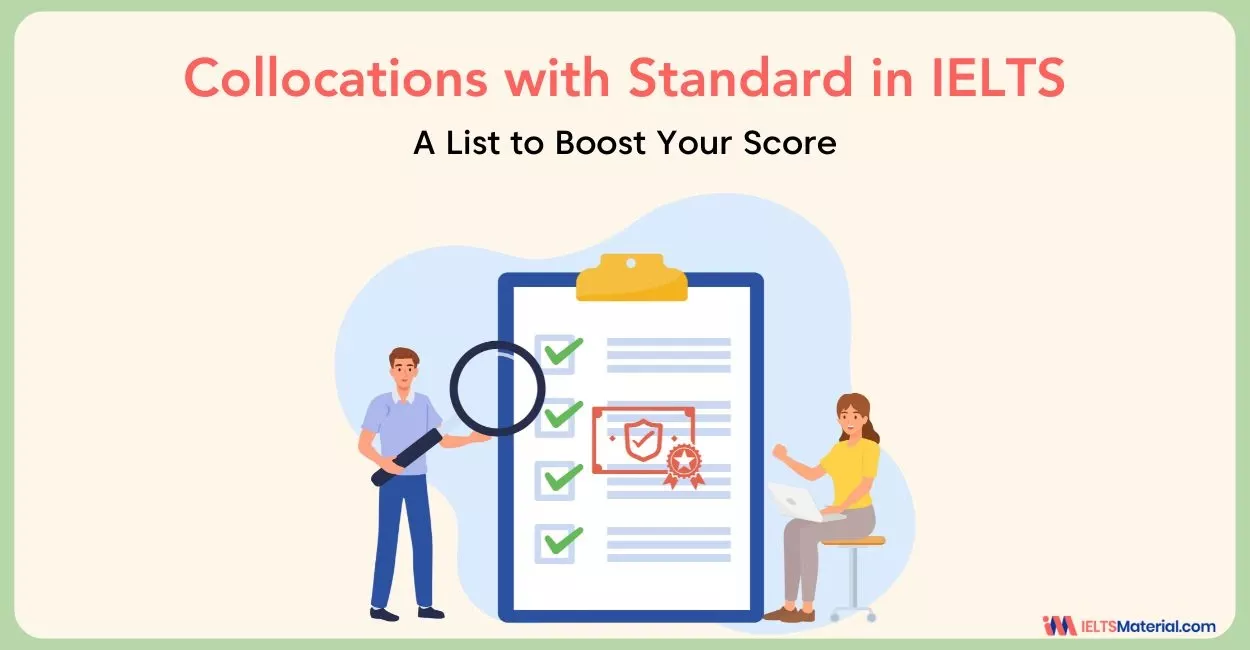Excuse Collocation for IELTS: A List to Boost Your Score
8 min read
Updated On
-
Copy link
Use excuse collocations to expand your IELTS vocabulary. With the help of this blog, you will learn more about their meaning, usage, and exercises to help you improve your English skills so you can perform better in the IELTS Listening and Speaking tests.
Table of Contents

Limited-Time Offer : Access a FREE 10-Day IELTS Study Plan!
In everyday communication and especially in IELTS Speaking, we often need to explain, justify, or apologise for something. That is where the word ‘excuse’ becomes powerful. Using accurate and natural excuse collocations shows that you can handle subtle tones, express responsibility, and describe social situations fluently.
This blog will guide you through the most useful excuse collocations and related IELTS Academic high-frequency vocabulary words with clear meanings and examples to help you sound confident and professional.
Lists of Excuse Collocations for IELTS to Boost Your Score
Using collocations for IELTS not only makes your language natural but also adds variety to it. As a result, when you use appropriate excuse collocations in the right contexts, they boost your band score to 8+.
Therefore, we will explore lists of the top important collocations for IELTS related to ‘excuse’ in the tables below, along with their meaning and example sentences.
Verb + Excuse
These excuse collocation combinations describe how people create, use, or react to excuses. They are perfect for IELTS Speaking Part 2 or 3 when describing mistakes, behaviour, or daily situations.
|
Verb + Excuse |
Meaning |
Example Sentence |
|---|---|---|
|
Have an excuse |
to possess a reason or explanation for something |
I had a genuine excuse for missing the class; my bus broke down. |
|
Look for an excuse |
to try to find a reason to avoid something |
Some students always look for an excuse to skip homework. |
|
Make up an excuse |
to invent a false explanation |
He made up an excuse for arriving late to the meeting. |
|
Provide (someone) with an excuse |
to give someone a reason or justification |
The rain provided them with an excuse to cancel the trip. |
|
Run out of excuses |
to have no more explanations left |
She ran out of excuses for not finishing the project on time. |
|
Use (something) as an excuse |
to justify one’s action with a reason |
He used his busy schedule as an excuse for not calling back. |
|
Accept an excuse |
to believe or forgive someone’s reason |
The teacher accepted his excuse for being late. |
|
Reject an excuse |
to refuse to believe someone’s explanation |
The manager rejected his excuse and gave him a warning. |
|
Come up with an excuse |
to think of or create a justification |
She came up with a clever excuse to leave the party early. |
Common Adjective + Excuse Collocations
Adjectives describing ‘excuse’ help express quality, sincerity, or weakness, making them useful when evaluating someone’s behaviour or giving opinions in IELTS Writing Task 2.
|
Adjective + Excuse |
Meaning |
Example Sentence |
|---|---|---|
|
Convenient excuse |
a reason that is easy but not entirely honest |
He gave a convenient excuse to avoid responsibility. |
|
Good excuse |
a valid or reasonable explanation |
Having the flu is a good excuse for missing the meeting. |
|
Old excuse |
a reason used repeatedly and no longer convincing |
That’s such an old excuse; can’t you think of something new? |
|
Poor excuse |
a weak or unconvincing explanation |
“I forgot” is a poor excuse for missing an important deadline. |
|
Valid excuse |
a true and acceptable reason |
A family emergency is a valid excuse for your absence. |
|
Common excuse |
a reason used by many people |
Being ‘too tired’ is a common excuse for not exercising. |
|
Weak excuse |
not strong or believable |
His weak excuse didn’t fool anyone in the office. |
|
Typical excuse |
a predictable or expected justification |
Blaming traffic is a typical excuse for lateness. |
|
Lame excuse |
an unconvincing or silly explanation |
That’s a lame excuse; you could have at least called! |
|
Pathetic excuse |
extremely poor and disappointing justification |
His pathetic excuse made everyone laugh. |
|
Feeble excuse |
a weak or ineffective attempt to explain something |
She made a feeble excuse to cover up her mistake. |
|
Ridiculous excuse |
completely unbelievable explanation |
He gave a ridiculous excuse about aliens blocking the road. |
|
Half-hearted excuse |
lacking sincerity |
Her half-hearted excuse showed she didn’t really care. |
|
Flimsy excuse |
lacking substance or credibility |
That flimsy excuse won’t stand up in a serious discussion. |
Common Expressions with ‘Excuse’
These expressions are common in spoken English and appear naturally in IELTS Speaking, especially in everyday or anecdotal contexts.
|
Expression |
Meaning |
Example Sentence |
|---|---|---|
|
Excuse me! |
polite phrase to get attention or apologise |
Excuse me, could you tell me the time, please? |
|
Make no excuse for (something) |
to not try to justify behaviour |
I make no excuse for speaking my mind. |
|
That’s no excuse! |
a phrase rejecting someone’s justification |
Being tired is no excuse for being rude. |
|
What’s your excuse? |
asking someone to justify their action |
You’re late again. What’s your excuse this time? |
|
By way of excuse |
as an explanation or defence |
By way of excuse, she said she had been feeling unwell. |
|
There’s no excuse for (something) |
There is no acceptable reason |
There’s no excuse for discrimination in the workplace. |
|
Poor excuse for a (noun) |
a sarcastic phrase meaning ‘a bad example of’ |
That’s a poor excuse for a presentation; you didn’t prepare! |
Notes
|
Excuse Collocation for IELTS: Practice Exercises
Given below are some exercises that are designed to help you with your understanding and use of excuse collocations for IELTS. Therefore, take your time to complete them and test your overall comprehension of the lessons above for a better IELTS band score.
Exercise A: Use the correct form of these verbs.
|
have look for make up provide with run out of use as |
- I think I’ve _________ excuses for not doing my homework, so I’d better get started!
- So, why was Ted late again this morning? > Who knows? As usual he_________ some excuse about his car breaking down, but nobody believes a word he says any more.
- Football teams always blame the referee when they lose a game, but everyone knows they only _________ him _________ an excuse for their poor playing.
- I’m sorry I _________ no excuse for being late. It was my own stupid fault. I slept in.
- Our son, Josh, is really lazy. He’s always_________ an excuse to avoid doing any work around the house.
- My father’s illness __________________ an excuse not to have to go to Mary’s leaving party. I was glad to see her go!
Exercise B: Use these adjectives to complete the sentences.
|
convenient good old poor |
- No, he didn’t come and help us after promising to. He gave some ____________ excuse about falling asleep in front of the TV and expected us to believe it.
- Dad will be absolutely furious! We’ll have to think up a pretty_________ excuse for staying out so late.
- He’s always making the same _________ excuse for not finishing his work on time. I’m becoming sick and tired of listening to them. Can’t we just fire him?
- Fortunately, I have a _________ excuse for missing the meeting. My son’s been taken ill at school and I’ve got to take him home.
We use a number of verbs for providing excuses. Find the four in the sentences above:
_________ _________
_________ _________
Exercise C: We use a number of words to describe poor excuses. Underline them in the sentences below:
- You missed the bus! That’s a lame excuse – you should have left the house a bit earlier.
- I’m afraid I can’t come – I’ve got to go home and feed my dog. > Oh, come on, that’s a pathetic excuse!
- He said he couldn’t play because he had hurt his finger. What a feeble excuse!
- You won’t come out with me because you’re planning to wash your hair! That’s not much of an excuse!
Explore our Vocabulary for IELTS to boost your IELTS vocabulary!
Excuse Collocations Answer Keys for Practice Exercises
Ex A:
1 run out of 2. made up 3. use him as 4. have
5 looking for 6. provided me with
Ex B:
- poor 2.good 3. old 4. convenient
verbs = give, think up, make, have
Ex C:
- lame 2. pathetic 3.feeble 4. not much of
To conclude, the word ‘excuse’ may seem simple, but it’s incredibly versatile. It is used in daily English conversations, ranging from formal apologies to casual stories, thereby making excuse collocations essential for improving your IELTS vocabulary. So, the next time you talk about a mistake or delay, try using one of these collocations instead of a basic phrase, and you will instantly sound more fluent and confident!
Useful Links:
- Account Collocation for IELTS: A List to Boost Your Score
- Answer Collocation for IELTS: A List to Boost Your Score
- Using Collocation to Boost Your IELTS Score - Topic: Responsibility
- Using Collocation to Boost Your IELTS Score - Key Word: Circumstances
- How to Improve Your Vocabulary Score in IELTS Writing and Speaking?

Start Preparing for IELTS: Get Your 10-Day Study Plan Today!
Learn more Collocations

Kasturika Samanta

Nehasri Ravishenbagam

Kasturika Samanta

Kasturika Samanta
Recent Articles

Nitika Gupt

Nehasri Ravishenbagam

Nehasri Ravishenbagam





Post your Comments